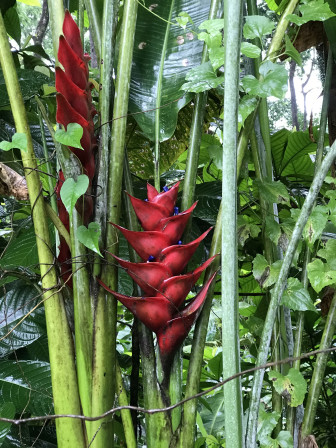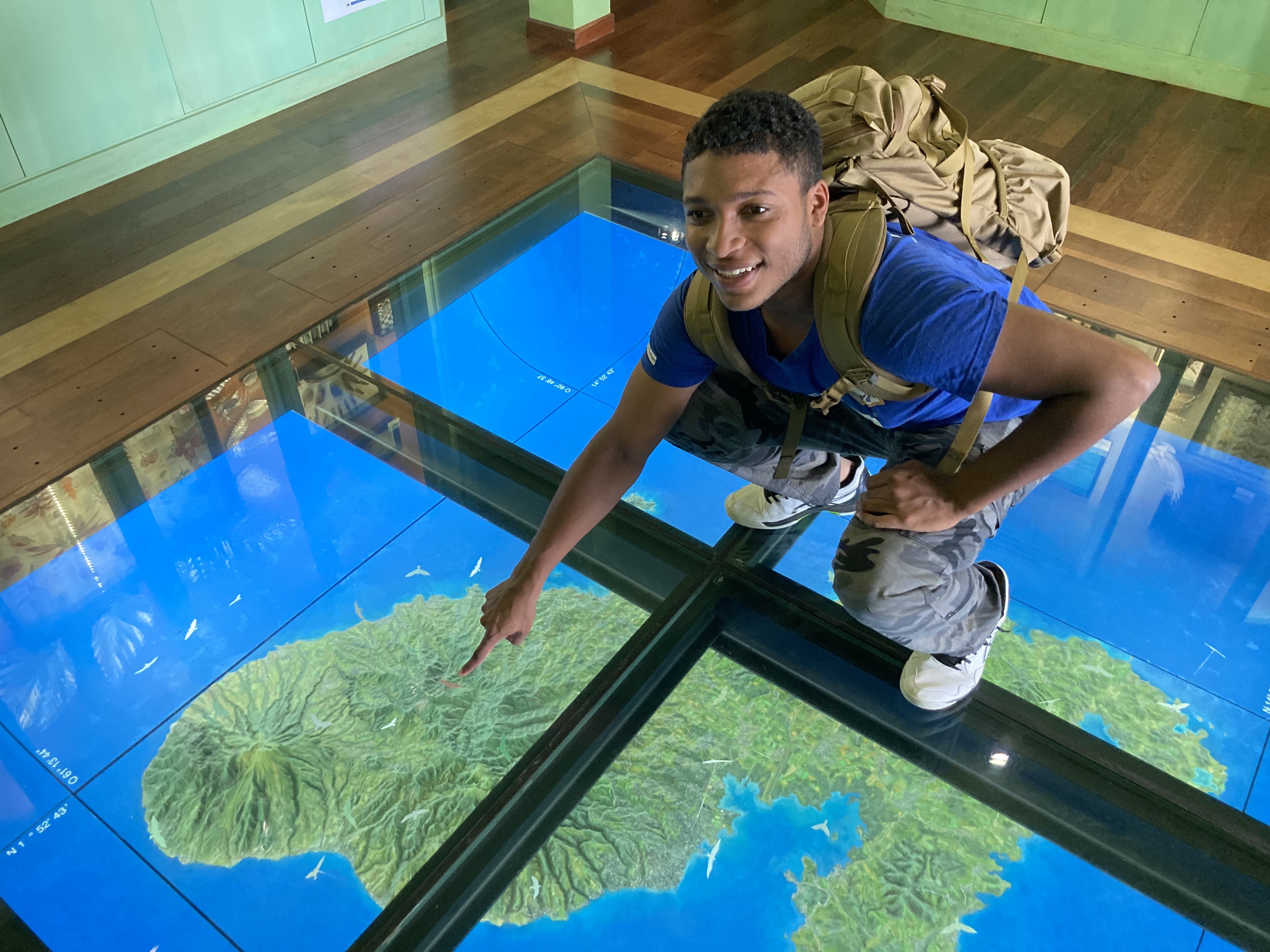Diversité, évolution et conservation des interactions plantes-animaux dans les anthroposystèmes forestiers des Antilles-Guyane / Diversity, evolution and conservation of plant-animal interactions in forest anthroposystems in the West Indies-Guianas
 (VERSION FRANCAISE) La thèse vise à étudier les effets de l’anthropisation des écosystèmes forestiers tropicaux et de la dégradation des services écosystémiques. Les objectifs sont d’acquérir de la connaissance sur le fonctionnement de la pollinisation ainsi que de la dispersion des graines de Heliconia caribaea (Zingiberales), plante patrimoniale et commune en sous-bois dont les fleurs sont pollinisées par les colibris et les fruits sont consommés par des oiseaux, en milieu insulaire et de comprendre les conséquences de l’anthropisation urbaine ou agricole. Une étude des interactions biotiques par le biais de pièges caméras dans différentes forêts humides de la Martinique, associée à une analyse de la diversité génétique et des flux géniques intra/inter populations seront réalisées au cours de ce projet de recherche. Cette thèse vise également à fournir aux gestionnaires des milieux naturels (DEAL, Parc Nationaux et Réserves Naturelles) des indices écologiques qui leur permettraient de déterminer la sensibilité de ces espèces aux diverses activités anthropiques et de prévoir leur devenir à long terme selon les degrés de perturbation des habitats forestiers. Les résultats permettront de mettre en place des outils et des indicateurs de santé des habitats – éventuellement à travers le développement de sciences participatives (e.g. Programme STOC MNHN) – afin d’évaluer la capacité de gestion de la biodiversité des anthroposystèmes dans le cadre d’un suivi à long terme des faunes et des flores. Enfin, ce projet de recherche complètera ainsi les recherches menées au sein de l’UMR ECOFOG sur la dynamique des forêts tropicales aux Antilles et en Guyane. (Photos : Heliconia caribaea en fleurs et en fruits en Martinique. (© Thomas NICOLE, MNHN).
(VERSION FRANCAISE) La thèse vise à étudier les effets de l’anthropisation des écosystèmes forestiers tropicaux et de la dégradation des services écosystémiques. Les objectifs sont d’acquérir de la connaissance sur le fonctionnement de la pollinisation ainsi que de la dispersion des graines de Heliconia caribaea (Zingiberales), plante patrimoniale et commune en sous-bois dont les fleurs sont pollinisées par les colibris et les fruits sont consommés par des oiseaux, en milieu insulaire et de comprendre les conséquences de l’anthropisation urbaine ou agricole. Une étude des interactions biotiques par le biais de pièges caméras dans différentes forêts humides de la Martinique, associée à une analyse de la diversité génétique et des flux géniques intra/inter populations seront réalisées au cours de ce projet de recherche. Cette thèse vise également à fournir aux gestionnaires des milieux naturels (DEAL, Parc Nationaux et Réserves Naturelles) des indices écologiques qui leur permettraient de déterminer la sensibilité de ces espèces aux diverses activités anthropiques et de prévoir leur devenir à long terme selon les degrés de perturbation des habitats forestiers. Les résultats permettront de mettre en place des outils et des indicateurs de santé des habitats – éventuellement à travers le développement de sciences participatives (e.g. Programme STOC MNHN) – afin d’évaluer la capacité de gestion de la biodiversité des anthroposystèmes dans le cadre d’un suivi à long terme des faunes et des flores. Enfin, ce projet de recherche complètera ainsi les recherches menées au sein de l’UMR ECOFOG sur la dynamique des forêts tropicales aux Antilles et en Guyane. (Photos : Heliconia caribaea en fleurs et en fruits en Martinique. (© Thomas NICOLE, MNHN).
(ENGLISH VERSION) The thesis aims to study the effects of anthropization on tropical forest ecosystems and the degradation of ecosystem services. The objectives are to acquire knowledge on the functioning of pollination and seed dispersal of Heliconia caribaea (Zingiberales), an emblematic common understory plant whose flowers are pollinated by hummingbirds and whose fruits are consumed by birds, in island environments, and to understand the consequences of urban or agricultural anthropization. The research project will involve studying biotic interactions through camera traps in various humid forests of Martinique, combined with an analysis of genetic diversity and gene flow within and between populations. This thesis also aims to provide natural environment managers (DEAL, National Parks, and Nature Reserves) with ecological indicators that would allow them to determine the sensitivity of these species to various anthropogenic activities and to predict their long-term fate according to the degrees of habitat disturbance. The results will facilitate the development of tools and indicators of habitat health – potentially through the development of citizen science programs (e.g., the STOC MNHN Program) – to assess biodiversity management capacity in anthropized systems within the framework of long-term monitoring of fauna and flora. Finally, this research project will complement the ongoing research at UMR ECOFOG on the dynamics of tropical forests in the Antilles and French Guiana. (Photos: Heliconia caribaea in bloom and fruiting in Martinique. (© Thomas NICOLE, MNHN).
Comité de suivi de thèse :
- Pierre-Michel FORGET (Directeur), MECADEV, MNHN
- Nathalie MACHON, CESCO, MNHN
- Jean-Baptiste MIHOUB, CESCO, MNHN

- Bruno FAIVRE, BIOGEOSCIENCE, Université de Bourgogne, Dijon.
- Pierre CLOAGEN, INRAE-AGROPARISTECH, Paris-Saclay.
Supports
- Ecole doctorale ''Sciences de la nature et de l'Homme : évolution et écologie'' (ED227 MNHN-SU)
- ECOTROP - MECADEV
- Domaine d'Emeraude, Parc Naturel Régional Martinique
- Collectivité Territoriale Martinique
- Conservatoire Botanique de Martinique
- Office National des Forêts Martinique
Collaborations internationales :
- John W. KRESS, Smithsonian Institution, Washington DC

Thomas NICOLE au domaine d'Emeraude, Parc Naturel Régional de Martinique. (c) all photos reserved.




Commentaires
(…)
3° escale : Le Durian, je t’aime moi non plus : Entre (Sève et sens)